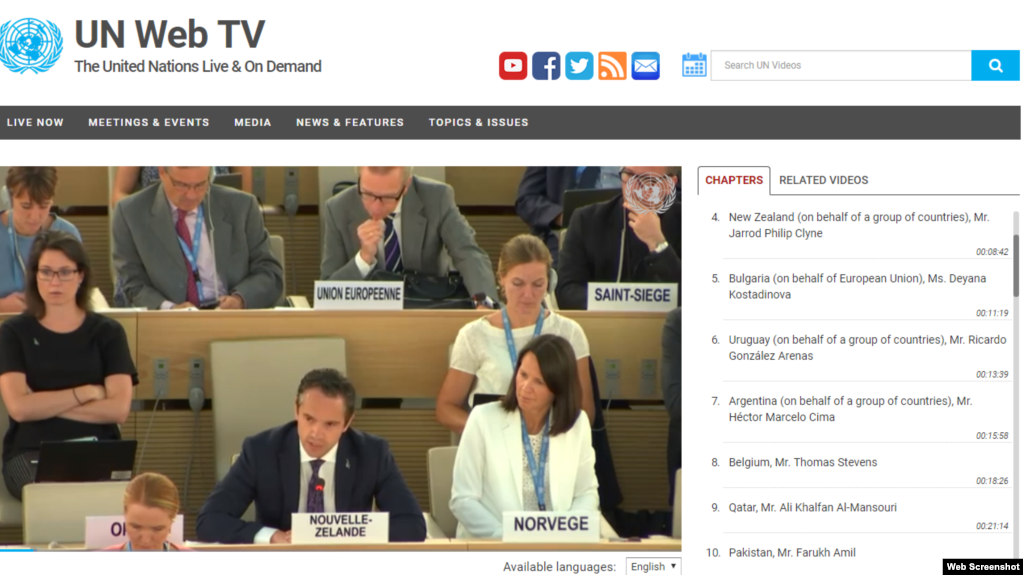 |
| A screenshot from the UN Web TV shows Jarrod Clyne, deputy permanent representative of New Zealand, talks during 38th Regular Session Human Rights Council, June 19, 2018. (Web screenshot) |
New Zealand Calls on International Community to Work for Cambodia Rights, Democracy
VOA | 21 June 2018
The Council also urged the release of Kem Sokha, the CNRP president who was jailed in September on treason charges for his supposed role in an alleged plot to overthrow Hun Sen.
WASHINGTON DC —
New Zealand has led several nations at the U.N. Human Rights Council in issuing a joint statement urging action on Cambodia’s deteriorating human rights situation.
Jarrod Clyne, Chargé d'Affaires of the New Zealand Mission in Geneva, said in a statement issued this week that the Council does not consider the current political environment in Cambodia “conducive to holding free, fair and genuine national elections.”
Cambodians are due to go to the polls on July 29 for the first time since 2013. Ahead of the election, the ruling Cambodian People’s Party, led by Prime Minister Hun Sen, has overseen an anti-democratic campaign against the country’s main opposition party, the Cambodia National Rescue Party, which has been dissolved and several of its leaders jailed or facing legal proceedings.
“An electoral process from which the main democratic opposition party has been arbitrarily excluded cannot be considered genuine or guarantee the free expression of the will of the voters,” Clyne said at the Council meeting.
He added that as well as dissolving the opposition party, the government had led a crackdown on freedom of expression, which has included threats to journalists, media restrictions, and the use of the judiciary to carry out partisan political aims.
He urged the release of Kem Sokha, the CNRP president who was jailed in September on treason charges for his supposed role in an alleged plot to overthrow Hun Sen.
"We will look to further consideration by the Human Rights Council if the human rights situation does not improve,” he added.
Human Rights Watch, a U.S.-based rights group, echoed Clyne’s concerns in a statement released on Tuesday.
“We encourage the High Commissioner to keep the Human Rights Council informed through intersessional briefings, and the Council should put in place monitoring and reporting of the human rights situation in Cambodia before, during, and after the elections,” read the release.
The United States has ended its funding of Cambodia’s election process in protest at the crackdown, while both Washington and Brussels have imposed limited sanctions against the Hun Sen regime. The measures have included visa bans and the blacklisting of senior officials, including the head of Hun Sen’s Bodyguard Unit, General Hing Bun Hieng.
Members of the Bodyguard Unit are alleged to be behind the deadly 1997 grenade attack on an opposition rally in Phnom Penh that killed a U.S. citizen and left Sam Rainsy, the former head of the CNRP, injured. The unit was also responsible for the beating of two CNRP lawmakers outside parliament in 2015.
Nhay Chamroeun, one of the lawmakers targeted in the attack, said the sanctions against the Bodyguard Unit were important.
“I hope this is only the first example [of sanctions] and I hope they continue,” he said.


No comments:
Post a Comment